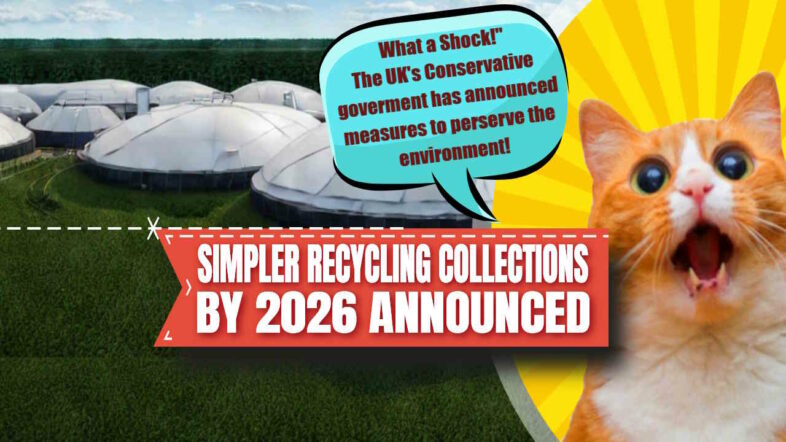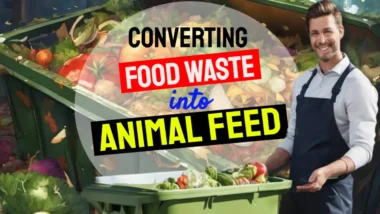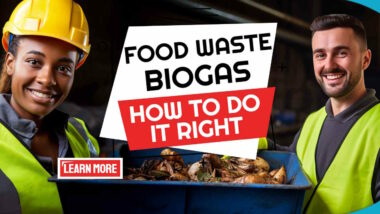“Simpler Recycling Collections” by 2026 as announced by Defra, also means that all local authority councils in England will provide householders with separate weekly food waste collections from the kerbside by the end of 2026.
On Friday 21 October the UK government put out a Press Release which is of interest to the AD community because it means that by 2026:
- almost all residents in England will be provided with a weekly household food waste collection and
- more than 2.2 million businesses will now also be required to separate their waste (including food waste) for recycling.
This will drive the construction of new biogas plants seeking to digest the additional tonnages of food waste available for use as a biogas plant feed material.
The press release has been crafted to make the plan popular with the electorate while not mentioning the fact that a lot more people will be required to spend time tediously separating their food waste into caddies for curbside collection every week!
“Weekly collections of food waste will also be introduced for most households across England by 2026 – ending the threat of smelly waste waiting weeks for collection and cutting food waste heading to landfill. This will also stop a trend towards three- or four-weekly bin collections seen in some local authorities across the UK, particularly in Wales.”
– UK Department for Environment, Food and Rural Affairs
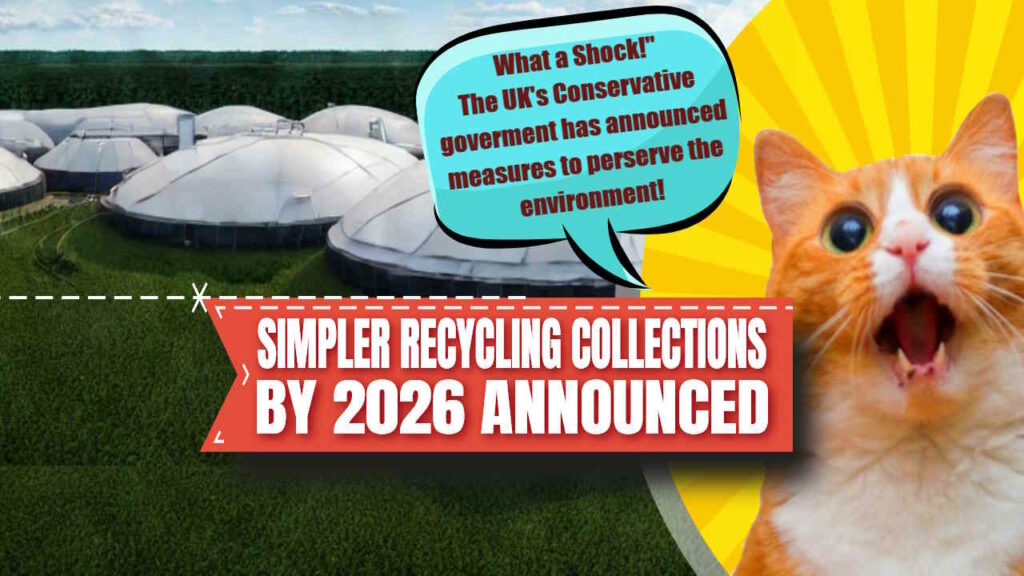
AD industry Trade organisation ADBA released the following which explains the official UK AD industry response:
“Simpler Recycling Collections” PRESS RELEASE 21 October 2023:
Anaerobic Digestion Trade Association welcomes Defra’s separate food waste collections in England announcement
Today, Defra published its long-awaited response to the Consultation on Consistency in Household and Business Recycling in England setting out guidelines and timelines for Local Authorities (LAs) to roll out food waste collections.
Charlotte Morton OBE, Chief Executive of the Anaerobic Digestion and Bioresources Association (ADBA), said: “About time! – was our first reaction as separate food waste collections have been on the agenda for many years now, with the deadlines repeatedly delayed (1).
Separate food waste collections are the cornerstone for an effective implementation of Defra’s Food and Drink Waste Hierarchy and now Local Authorities and anaerobic digestion (AD) operators can plan with confidence to put contracts and infrastructure in place to ensure inedible food waste goes to AD treatment as the first recycling option. The food waste collected will provide an invaluable new source of feedstock for AD plants to produce renewable gas for heat, electricity and transport fuel, and biofertilisers for soil health and improved crop yields (2).
It’s a great step forward to establish a circular economy around food waste and food production for the benefit of all and to ensure increased energy and food security in England. We’re all winners in this and it is imperative that no further delays are incurred in rolling out separate food waste collections.”
(1) The response from Defra on simpler recycling systems was due in 2021. The delays created a state of paralysis for LAs, who, without clear timeframes and funding information, had been unable to work toward their legal targets proactively. The initial deadline for mandatory separate food waste collection in England was 2023 – ie this year.
(2) Under the Green Gas Support Scheme, AD operators are required to generate at least 50% of biogas from waste.
-ADBA Simpler Recycling Collections PR ENDS –
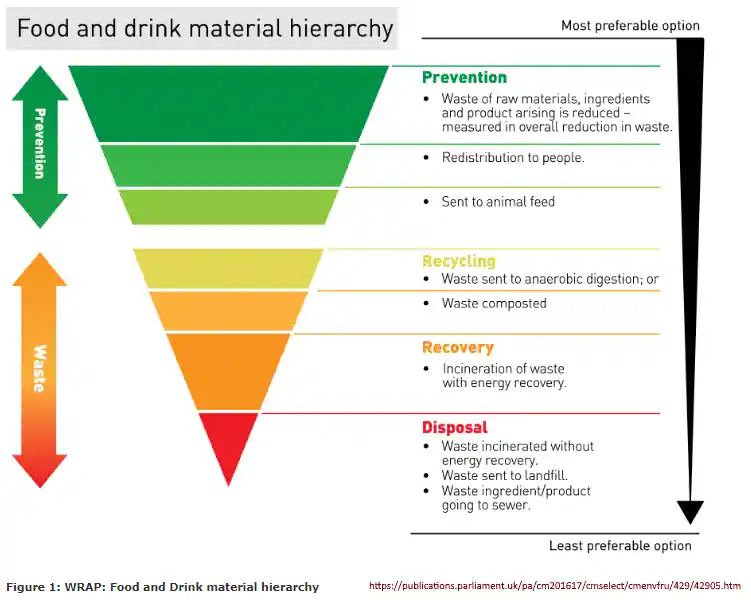
Background to the Food Waste Strategy Now Referred to as Part of the UK Government Policy Simpler Recycling Collections
Historic demonstrator facilities
The 1990s saw anaerobic digestion (AD) receive a significant boost from Defra funding through the establishment of demonstrator facilities such as the Ludlow AD plant. This move sparked positive discussions about its benefits and likely contributed to increased investment in developing similar plants.
Low Enthusiasm 2017 to 2023
However, recent years have witnessed dwindling enthusiasm towards AD development due to lacklustre government support. Nonetheless, given current high natural gas prices that show no signs of decreasing anytime soon coupled with food waste policies taking shape; now is an opportune moment for us all to reignite our passion for this technology's potential contributions. Contributions towards more efficient waste treatment methods while generating renewable energy simultaneously. thus promoting circularity within our systems.
Simpler Recycling Collections Announcement Likely to Rekindle AD Development Interest
The time has come once again for us to embrace Anaerobic Digestion!
The UK has made significant progress in adopting anaerobic digestion (AD) technology for waste management with 723 operational AD facilities currently functional across the country. Out of these, around 650 are capable of accepting and treating food waste streams effectively.
However, as mandatory food waste collections become a reality by 2026, there is concern that demand may outstrip capacity leading to costly gate fees and transportation expenses for local authorities tasked with managing this waste stream.
Simpler Recycling Collections Policy Brings Challenges
This situation presents both challenges and opportunities for investors looking at expanding their portfolio into new AD projects within the UK marketplace.
On one hand, it highlights the need for additional infrastructure development while on the other; it offers potential returns from increased efficiency gains through separate collection systems which could ultimately reduce overall costs over time.
With careful planning and strategizing, investments made now can help ensure long-term success when navigating uncertainties related to supply chain disruptions or regulatory changes down the line. Ultimately, investment in AD technologies represents a promising opportunity for those seeking sustainable growth prospects within the UK's evolving waste management landscape.
AD Benefits Arising from the Redistribution of Nutrients and Carbon
The processing of food waste through anaerobic digestion (AD) is not only more efficient than other methods but also enables the redistribution of nutrients and carbon while displacing fossil fuel-derived sources of energy. This system offers a range of benefits that make it widely considered a closed-loop technology for treating organic waste from various industries such as sewage treatment, silage management, and food production.
At IPPTS Associates, environmental and waste management consultants we work alongside local authority clients who have until this announcement been grappling with uncertainty in policy direction and timescales.
The segregated collection of food waste diverts this material away from residual bins into separate collections which many councils have already successfully implemented.
However, Council Officers who need assistance with any aspect of implementing “Simpler Recycling Collections” by 2026 are invited to request a quotation from our consultants by completing our Contact Form here.
LA Officers – Click to Contact Us for a Quote for Implementing Simpler Recycling CollectionsEarly Implementation of Action by LAs to Begin the New “Simpler Recycling Collections” is Recommended
Early local authority decision-making will be crucial to ensure fiscal viability by achieving market rates suitable for food waste processing through local capacity development. Additionally, councils may want to consider developing their own AD facilities capable of delivering high recycling rates along with renewable energy production and lower emissions.
Implementing the Changes
To ensure that the country can quickly implement new arrangements and achieve waste circularity and carbon reduction targets, it is crucial for local authorities to prioritize this matter.
The lack of currently available biogas digester capacity, in many areas of England, to process the extra food waste collected should not be allowed to hinder progress towards these goals; hence all Local Authority Waste Management Staff must act urgently on this issue.
By doing so they will be able to make significant strides in achieving their objectives while also benefiting society as a whole through sustainable practices.
Frequently Asked Questions (FAQ) about Simpler Recycling Collections
In this FAQ, we address common questions about the streamlined “Simpler Recycling Collections” process. This system aims to make recycling more accessible and efficient for everyone, ensuring a significant reduction in waste and environmental impact.
1. What are “Simpler Recycling Collections”?
“Simpler Recycling Collections” is a UK Defra initiative that streamlines the recycling process. It's designed to make the separation and disposal of recyclable materials more straightforward for consumers, thereby increasing participation rates and reducing the amount of recyclables that end up in landfills.
2. How does this simplified collection system work?
This system involves providing households and businesses with clearly labelled bins or bags dedicated solely to recyclable materials. These containers are then collected by waste management crews on designated days, similar to standard garbage pickup schedules, but the contents are sent to recycling facilities and biogas plants instead of landfills.
3. What items can I put in my recycling bin?
Typically, you can place clean paper, cardboard, metal cans, plastic bottles, and glass containers in your recycling bin. However, until “Simpler Recycling Collections” start each local program has its own guidelines. So, for now, it remains important to verify the recyclable materials list with your service provider.
4. Why is it important to rinse containers before recycling?
Rinsing your containers helps prevent food waste from contaminating recyclable materials. Contamination can make recyclables less valuable, more difficult to process, and, in some cases, can result in the material being sent to landfills. A quick rinse can significantly increase the chances of the items being recycled properly.
5. Will “Simpler Recycling Collections” cost anything extra?
The cost can vary. For ratepayers, the simpler recycling service is going to be included in your waste management fees. Contact your local authority waste management department for specific information about your area.
6. How will single-stream recycling fit into this initiative?
Single-stream recycling, where all non-organic recyclables are placed into one bin and sorted later at a recycling facility, is part of making recycling simpler for consumers. This convenience encourages more people to recycle, thereby increasing the volume of materials diverted from landfills. However, it's essential to only include items accepted in your local program to minimize contamination.
7. Can businesses participate in Simpler Recycling Collections?
Absolutely. All businesses will be required to participate by arranging for recycling collection services and educating their staff about proper recycling practices. Depending on the business type and volume of recyclable waste, customized solutions may be available through local waste management providers.
8. What impact does effective recycling have on the environment?
Effective recycling conserves natural resources, reduces the need for raw material extraction, and decreases pollution and greenhouse gas emissions. It contributes to energy savings and the mitigation of global climate change impacts.
9. Where can I find more information about recycling practices in my area?
Local municipalities or waste management services can provide guidelines and information about recycling practices in your specific area. They can offer resources on acceptable materials, collection schedules, special disposal events, and more.
Finally, your commitment to recycling and proper waste disposal supports a healthier, cleaner environment and sustainable living practices. Every item correctly recycled makes a difference!



